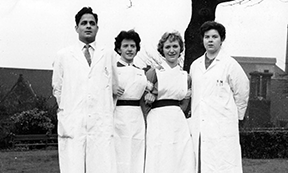 Shaiza Rizavi with husband Jonathan Friedland
Shaiza Rizavi with husband Jonathan FriedlandInspired by Weill Cornell Medicine’s work to improve mental health in older adults, Shaiza Rizavi and her husband, Jonathan Friedland, have made three generous gifts to establish an endowed fund in support of research in geriatric psychiatry.
The Alay Zamin Rizavi Research Fund in Geriatric Psychiatry – established with the three gifts – will support work in the field. Weill Cornell Medicine’s leading physician-scientists in geriatric psychiatry are Dr. George Alexopoulos, director of the Weill Cornell Institute of Geriatric Psychiatry, the Stephen P. Tobin and Dr. Arnold M. Cooper Professor in Consultation Liaison Psychiatry, and professor of psychiatry; and Dr. Faith Gunning, vice chair for research and psychology in the Department of Psychiatry and associate professor of psychology in psychiatry.
The couple’s gifts will promote advances in care, research and teaching in geriatric psychiatry with the aim of pioneering new therapies. The fund is named in honor of Ms. Rizavi’s late father, a prominent cardiologist who emigrated with his family from Pakistan in the 1970s to pursue a World Health Organization fellowship at what is now NewYork-Presbyterian/Weill Cornell Medical Center.
Four decades after her father’s fellowship, the couple began their own exploration of Weill Cornell Medicine and were particularly drawn to the institution’s research in the neuroscience of aging, and the development of new treatment tools using digital technologies, including apps and video games. For the geriatric population – which is often underserved and overmedicated – these novel approaches represent an important shift in patient care, Ms. Rizavi states.
“The union between technology and health care provides hope in revealing and addressing some of the greatest challenges,” says Ms. Rizavi. “The field of geriatric psychiatry has the potential to be fundamentally transformative, and the research and talent within Weill Cornell Medicine is altering the thinking about how older adults connect with the world. Observing these researchers’ innovations to seek better outcomes for their patients, we begin to imagine how lives will change for the better.”
Researchers at Weill Cornell Medicine are also using revolutionary MRI techniques to examine brain network abnormalities that are central to mood disorders in older adults and better understand the contributing factors that lead to elderly patients’ poor response to antidepressants. The overarching goal is to develop behavioral therapies, digital cognitive interventions and non-invasive neuromodulation treatments that can successfully target this population.

Dr. Alay Zamin Rizavi, at left, during his medical
training in the early 1960s in the United Kingdom.
“These visionary gifts from Ms. Rizavi and Mr. Friedland will fortify our ability to advance cutting-edge research in geriatric 0psychiatry and help us train the next generation of clinician-scientists focused on aging and mental health,” says Dr. Francis Lee, chair of the Department of Psychiatry and professor of psychiatry. “We are profoundly grateful for their commitment to the field, and their dedication to improving the lives of so many older adults.”
